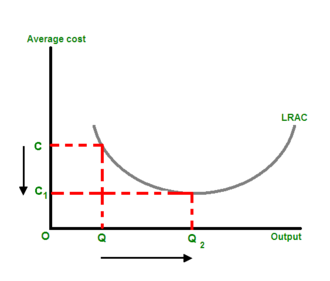"If the US Government was a family, they would be making $58,000 a year, they spend $75,000 a year, & are $327,000 in credit card debt. They are currently proposing BIG spending cuts to reduce their spending to $72,000 a year. These are the actual proportions of the federal budget & debt, reduced to a level that we can understand." - Dave Ramsey
This got me thinking a little bit about economies of scale whereby as a company or organization expands it becomes more efficient to the product it offers. Here is a basic chart that describes the fundamental concepts behind it:
This relates to our governments as well, while this is a micro economic principle it applies when you look at the corporation or family as the government and in reality many corporations are serving more population than that of many governments so it's not really that much of a stretch. What I see is that most modern governments are creeping up the right side of the curve, this part of the curve relates to the entity that has squeezed out all or most competitors from the market place and is now approaching monopoly status. The interesting thing is that this is easy to prove, Governments are inherently a monopoly by the purest definition of the word. Therefore as government grows and expands its product (regulation, entitlements, etc.) it will become more costly to its consumers (tax and tariff paying citizens). This alone is a great argument for reducing government size and scope in all things. The cost inefficiencies arise from several factors, heightened bureaucratic oversight needed, inappropriate recipients of benefits due to the complexity of oversight and heightened demand for these services as more consumers are pushed into needing these services because they can no longer afford the cost. It is no wonder or surprise that governments world wide are facing massive deficit spending and exponentially increasing national debts.
The U.S. was a great experiment by the founding fathers, once a united nation of independent states, now a nation of states subjected to serfdom to the federal government. The same principle applies the the European Union, once a united economic alliance of independent European nations, now is a block of nations in servitude to the European Unions policies. I bring this up because whether it was planned intentionally or a great accident, the original founding fathers had erected a form of government in which competition among localized governments would be possible and joined in such a way that if one local government was failing its citizens the simplest solution is that the citizen could move to a more favorable local government and one that had failed beyond repair could fall and be rebuilt anew by its citizens not impacting the rest significantly.
People tend to not think of a government as a corporation, but lets take a step back. The government charges for its services; through taxes, tariffs, and inflation. It provides a product to its customers; via entitlement programs, bureaucratic oversight, national defense and national regulation. These basic parts would be the same as one would see in a corporation. The only difference is that a government mandates its product and mandates the cost, but this too is not much of a difference from corporations because any corporation that becomes large enough with a dependent customer base sees the same effects, this kind of corporation is commonly referred to as a monopoly.
Isn't it ironic that governments viciously regulate corporate monopolies but choose to not restrain their selves?

No comments:
Post a Comment